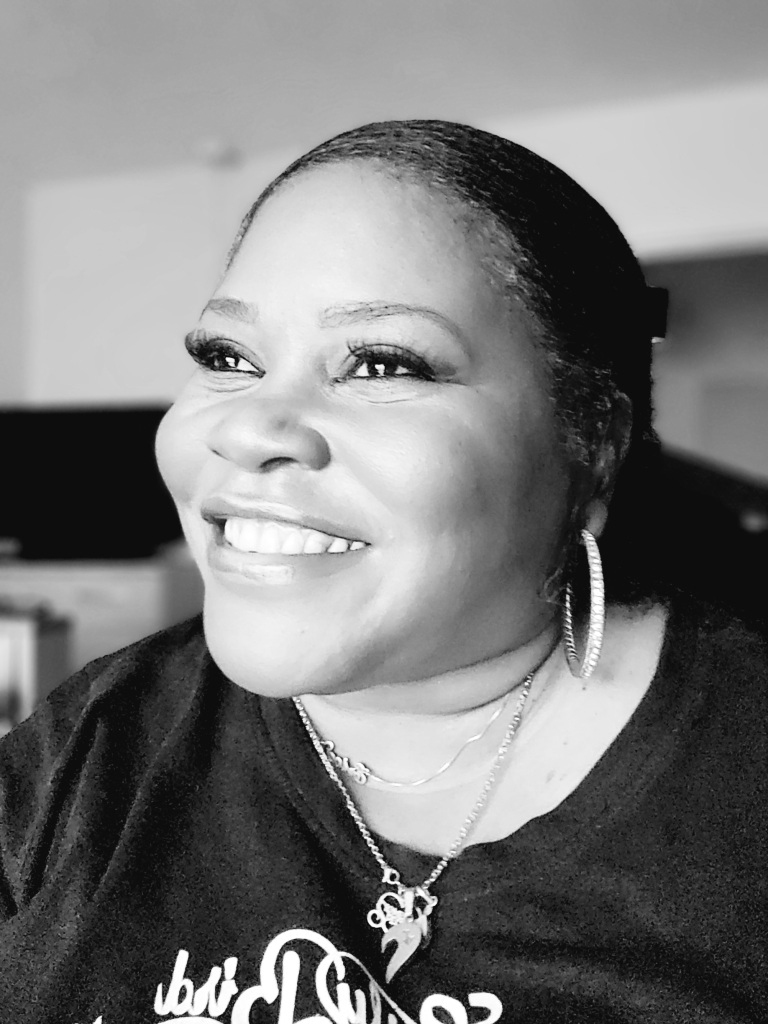
Welcome to the 5 Questions Series. Each week, I’ll ask five questions of some of my favorite authors, editors, publishers, and other industry professionals. This week, I’m talking with Erica Sharlette.
You’re very open about living and writing through the lens of disability. How does that affect your writing?
My health affects pretty much everything I do. I live with 20 chronic illnesses, of which Fibromyalgia is the worst, with 251 symptoms at last count. Its symptoms affect the entire body, both physically and neurologically, so from the moment I open my eyes, to the moment I try to close them again, some area(s) of my body is experiencing an effect. It’s not possible for me to ignore the chronic pain and other symptoms I experience, I tried to do that for several years, but eventually, I just learned I was making things worse so, I realised the way to manage my symptoms was to work around them.
For instance, by paying close attention, I discovered my pain levels are worse in the mornings and evenings. So, I try to give myself enough time in the mornings, so I don’t need to rush to get up. Doesn’t always happen, because no two days are the same; but when I can, I try to leave myself a gap of time, so I’m not hurrying to get in front of my laptop for 08:00 on weekdays, when I join London Writer’s Salon for their first Writer’s Hour of the day. I find this one toughest, because I’ll still be suffering with brain fog at that time, which is when I try to knock out my morning pages for the day.
Morning pages are difficult for me for two reasons: firstly, because brain fog by definition, makes my brain very confused and unclear, making the writing three stream of consciousness handwritten A5 pages tough to process; but in addition, Osteo and Rheumatoid Arthritis in my hands and wrists, in addition to the nerve and muscle pain caused by Fibromyalgia makes the act of writing difficult, and it often takes me longer than the 50-minute Writer’s Hour to finish them.
On the days when brain fog, chronic pain and fatigue are severe, or at their worst, I end up missing the session, or not getting anything done, and I really hate when that happens.
Do you struggle with keeping your voice when writing about tough topics?
Though I started the first draft of my memoir in 2016, I only started writing flash fiction and short stories in 2021, so I still feel like a novice writer. I know the kind of impact I would like to have with my words, but I feel that I’m still at the very beginning of the journey to find my voice; I definitely don’t feel like I’ve found it yet.
How important is writing community to you?
It’s everything! Ever since I joined Writer’s HQ in March of 2021, my motivation has come along leaps and bounds. I finished the first draft of my memoir and the first draft of fifteen chapters for my novella-in-flash by November. Being housebound, I don’t get out to interact with people as much as I used to, so seeing the same faces looking back at me through a Zoom screen keeps me going and feeds my need for human interaction. In addition to the 08:00 Writer’s Hour, I also try to attend the London Writer’s Salon 13:00 and 16:00 sessions on weekdays. There are also interviews and workshops in the evening where I get to interact with regular faces.
In between all that, LWS host my favourite space, called The Cabin. Open 24 hours, it’s a Zoom room with no sound, where you can go and work alongside other writers, so you keep each other company in a space where you can do nothing but focus. I always get so much done in there, I absolutely love it!
Beyond that, there are the online writing communities on social media that allow me to interact and share my highs and lows. They help keep me sane!
What is your ‘Statement of Intent’ and how did it come about?
Back in 2021, I had a hospital appointment with the coldest, most unfeeling consultant, who I was seeing about my pain management. Bearing in mind I had explained to him I had suffered pain in more than 29 places on my body, and the medication I was on was barely doing anything to help me manage it, he rudely told me I couldn’t possibly hope to maintain the level of medication I was on, and that I should be able to manage with CBT and breathing exercises.
He was unmoved by my descriptions of not being able to lift my head off my pillow because of pain sometimes, and I left the appointment seething at how offensive this man who clearly had no concept of how deeply pain can affect you, had just dismissed something I have to battle every day of my life. The counsellor I was seeing at the time asked me how I felt I could best use my anger to my advantage and, after sitting with the question for a few days, I had a light bulb moment.
I asked myself how I could best spread the word about this condition, and the lack of support I was adamant I could not be the only person experiencing. I sat down and brainstormed the idea, and a list of ways I could use the only weapon at my disposal, my (underdeveloped) voice began to emerge. I posted it on my Facebook page for my writing, and I’ve been working my way through it ever since. It’s my goal to complete every item on it. I’m deep underway, and I’m prouder of that than anything else.
What advice would you give other writers who want to write about their personal identities but are worried how the work will be received?
I would say it’s no different to choosing your wardrobe, hairstyle, or makeup. You decide how you want to represent yourself and open the front door. Every step you take leads you to a destination of your choosing, and it’s no different with putting your words out into the void. If anything, writing is easier, because no-one is looking directly at you while they judge you!
What are you working on now and where can people find you on the web?
I’ve paused the edit of the first draft of my memoir to work on my first novella-in-flash. The lack of focus, knowledge, and understanding of Fibromyalgia in the UK is shocking. It’s light years away from the US and Australia, so I felt it was more important for me to devote my time and energy to that. Fibromyalgia is known as ‘the umbrella illness’ because it encompasses so many other conditions beneath its heading.
Entitled ‘Under the Umbrella,’ it’s a fictional look at characters living with some of Fibromyalgia’s more recognisable symptoms. They come from all walks of life and have nothing other than the illness in common; they are a variety of ages and ethnicities, but they all interact with two central characters on one particular day, and we see how the illness affects each of their lives.
I pretty much live online, so you can find me and my published work below:
Facebook.com/ReflectionsOfEricaSharlette
Instagram.com/ReflectionsOfEricaSharlette
Bonus question: Have you ever taken a picture of a weird bird?
I’ve never taken a picture of a weird bird…I don’t think I’ve ever seen a weird bird in person before? Once upon a time, however, back in 2010 when I had my first blog, I used to photograph events, fashion, and jewellery collections. One of my favourite images actually came from my least favourite event. I won’t say the name of it, as it wouldn’t be professional, but I didn’t realise how much I liked the image until it came time to edit it for the event album. I just love the sensuality of the light and the way it bathes the model who looks positively scrumptious in the ensemble she’s rocking, with the eyes wide shut-esque mask. It’s just sexy!

Leave a comment